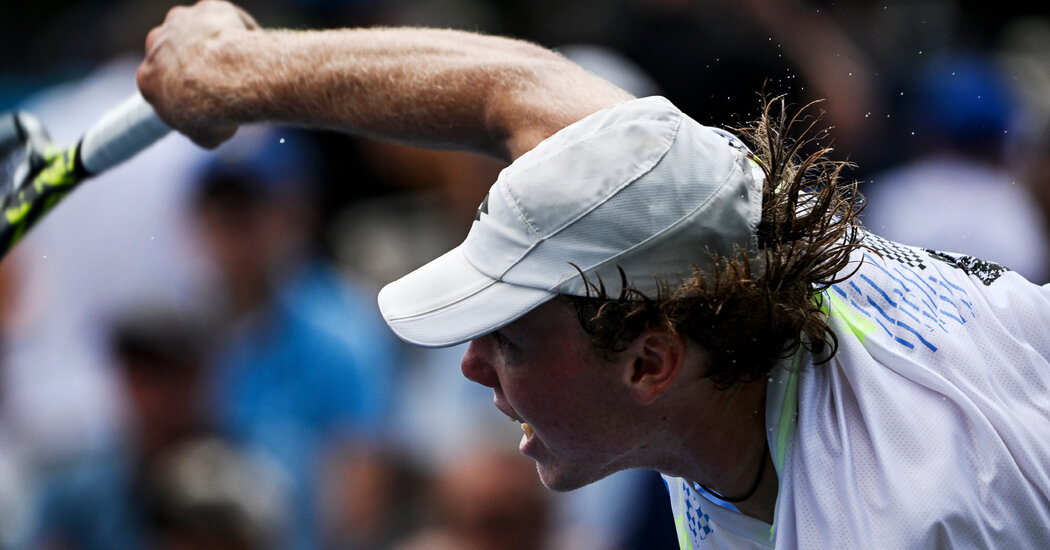
Things some teenagers do that make adults crazy: spending too much time on devices, leaving dirty dishes in the sink and sending hard backhands down the line.
Albert Ramos-Vinolas, 35, had seen enough of the latter from 19-year-old Alex Michelsen in their first-round encounter at the U.S. Open on Tuesday. After the final point of Michelsen’s surprisingly easy victory, 6-4, 6-3, 6-4, Ramos-Vinolas slammed his racket onto the court twice, mangling it beyond repair.
Ramos-Vinolas, a veteran left-hander who was once ranked No. 17 in the world, had just learned what tennis insiders had already been discovering this summer: that Michelsen is one of the hottest young American men to emerge in an already deep collection of players.
Ranked 601st at the beginning of the year, Michelsen has burned through the rankings like a comet, reaching No. 127 going into the U.S. Open. His standing is set to rise even higher after his already impressive performance this week at his first Grand Slam tournament, which started only five days after he turned 19.
“Two years ago, I never thought this would happen this quickly,” Michelsen said after the match. “I thought I would go to college and then try to figure out the tour after college. But I’m really happy with my timeline.”
Until his summer surge, Michelsen was considered a top college recruit, headed to the University of Georgia, where he was expected to hone his game and eventually, hopefully, join the professional tour. But after tearing through the challenger tour — tennis’ minor league — the last few months, scoring impressive wins over excellent, experienced players, Michelsen decided to forego college and turn pro.
In July, he won the Chicago challenger tournament and reached the final of the ATP tournament in Newport, R.I., beating Kei Nishikori, a past U.S. Open finalist; John Isner, a former top-10 player; and Mackenzie McDonald, then ranked No. 59, along the way.
His real-time ranking rose to No. 115 after he beat Ramos-Vinolas, and up next on Thursday is No. 25 Nicolas Jarry in the biggest match of Michelsen’s life — again.
The son of two college tennis players, Michelsen began playing the sport at age 3. His mother, Sondra, starred at San Diego State and his father, Erik, was a three-time all-American at the University of Redlands in Redlands, Calif.
“My parents had contrasting game styles,” Michelsen said. “My mom would stay at the baseline and make every ball. I took that from her. My dad likes to serve and volley, come to the net and be more creative, so I took that from him. I feel like I’ve combined those two very well.”
With his integrated tennis DNA, Michelsen features a well-rounded game, firing right-handed forehands and serves even though he was a left-handed baseball player as a kid. With a wide variety of talents, Michelsen can adapt to combat his opponents’ strengths and styles with a savvy court and tactical awareness, also bequeathed in part from his parents.
But unusual for many young players, Michelsen came to New York without his parents, who remained home for work and to look after Holly, the family’s new King Charles Cavalier puppy. Michelsen also went to the Chicago challenger with a friend and traveled solo to Newport, R.I. Earlier this summer he went to Europe with Eric Diaz, who coaches Michelsen along with Jay Leavitt, his partner at the Tier 1 Performance academy in Newport Beach, Calif.
“It’s a healthy balance,” Diaz said. “His mom and dad taught him so much about the game and they also know when to give him time to grow on his own. Alex likes that and it is worked very well for him.”
The growing process can often be an uneven one for emerging tennis players, full of bumps and ugly outbursts. Michelsen has at times demonstrated emotional volatility and Diaz, who played at Georgia for his own father and coach, Manny Diaz, has sternly urged Michelsen to contain his turbulent teenage emotions on court.
The pair were in England after a tournament in Nottingham this summer. The plan was to move north and play another grass-court tournament in the country. Michelsen did not make the cut into that event, so he and Diaz checked the tournament schedule and the map. They traveled 16 hours by train to Blois, France, for an event on clay, but Michelsen had only grass-court sneakers. He struggled with the footing, resulting in several combustible moments.
“There were a few hats thrown and maybe a ball that might have wandered out of the facility that might have been his fault,” Diaz said.
He laughs at the memory, but it was not as funny at the time. Diaz walked away from the court during a couple of matches and then later told Michelsen it was time to grow up.
“If you’re going to act like a kid, then I’m going to leave,” Diaz said. “I told him afterward, ‘I don’t know if you’ve noticed, but you are pretty good and it’s about time to let the tennis do the talking and to control the attitude. You are going to be on stages where you will have a lot of eyes on you.’ I think the realization set in and the maturity set in. He’s really carrying himself well, now.”
Indeed, the teenager was composed and in top form in the first round. It was the adult throwing the tantrum.